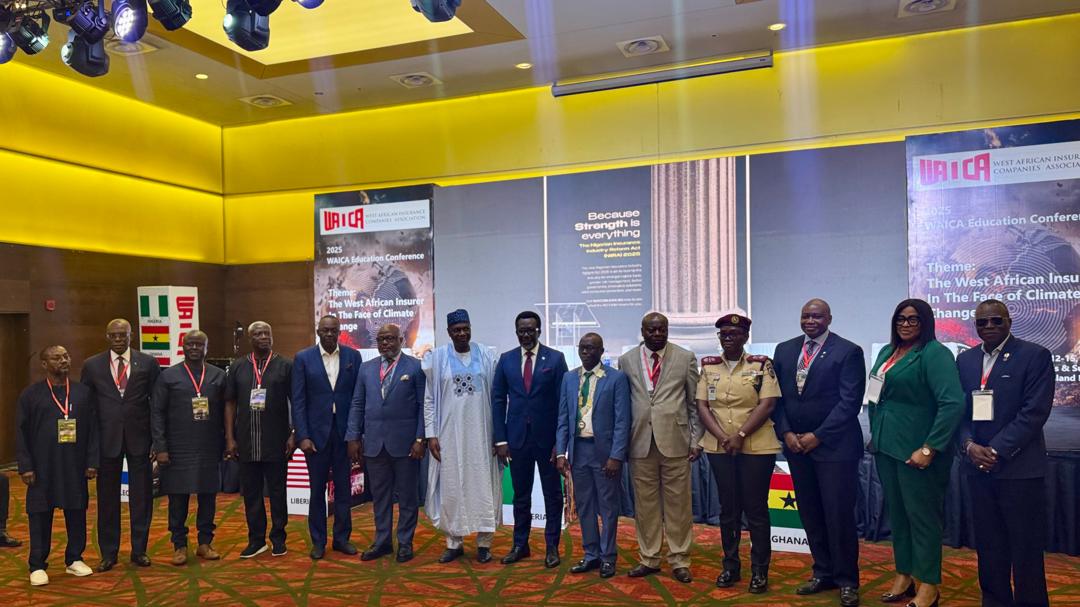Yemisi Izuora
The National Insurance Commission (NAICOM) has proposed a broad framework that will offer greater flexibility and growth for regional insurance companies.
The Commission says insurers, reinsurers, and industry leaders within the sub-region should innovate boldly, develop parametric and microinsurance products tailored to the region’s climate realities
In addition they should invest in data and technology to improve climate modelling, risk assessment, and product delivery, and improve collaboration across borders, pooling risks and resources to build regional resilience.
These are the areas Nigeria’s Commissioner for Insurance, Olusegun Ayo Omosehin, called stakeholders in the industry to aim at in his remarks at the 2025 West African Insurance Companies Association (WAICA),a regional Association of insurance companies and institutions which opined in Lagos today.
Omosehin, further challenged the conference to expand inclusion, ensuring insurance reaches farmers, market women, artisans, and micro-entrepreneurs—the backbone of our economies.
They should also prioritize capacity building, investing in the next generation of insurance professionals as insurance must evolve from a transactional service to a strategic enabler of development.
Coming home, the Commissioner noted that in many African nations, Nigeria faces a significant climate finance gap.
According to him, Traditional budgetary responses are no longer sufficient. We must strengthen financial instruments that allow us to anticipate shocks rather “than merely react to them.
When integrated into national planning, insurance becomes one of the most effective tools for climate risk management and economic resilience.”
However, he said the Federal Government of Nigeria has responded decisively through the Nigerian Insurance Industry Reform Act (NIIRA) 2025. This landmark legislation modernizes our regulatory framework, enhances consumer protection, and reinforces the financial resilience of insurers.
Key provisions of NIIRA 2025 include, a stronger capital base for operators , Expansion of compulsory insurance classes, including agriculture and environmental risks, Deeper integration of insurance into public-private partnerships for infrastructure and climate resilience, Strengthening of public confidence in the insurance industry, among others.
These reforms he said are not merely technical but are foundational to the national preparedness and long-term sustainability.
On the conference, he said, “Today, we gather not merely as insurers, regulators, and industry leaders, but as stewards of West Africa’s future. The theme of this year’s conference, “The West African Insurer in the Face of Climate Change,” is more than a topic for discussion—it is a call to courage, innovation, and solidarity.
Climate change the Commissioner pointed out is rewriting the narrative of our region.
“It is testing the strength of our economies, the endurance of our communities, and the responsiveness of our institutions. It has become a macroeconomic threat, influencing fiscal policy, national budgets, and the stability of our financial systems.
“The evidence is sobering. In 2024, flooding affected over 7.5 million people across 16 West African countries. Nigeria alone accounted for 1.3 million displaced persons. In 2025, over 33,000 Nigerians were displaced, 3,800 homes destroyed, and 5,300 hectares of farmland submerged—threatening food security and economic stability.
“These are not just statistics—they are stories of disruption, loss, and delayed development. Yet, within this crisis lies an opportunity: to redefine the role of insurance as a force for resilience and sustainable development.”
In closing, Omosehin, said that as a regulator, the NAICOM, is committed to enabling policies that foster collaboration between operators, regulators, and development partners.
He went further to add that strengthening climate resilience across West Africa demands a unified approach—one that blends sound regulation, market innovation, and strategic partnerships.
“Let this conference mark a turning point—where insurance becomes central to our climate response and a driver of inclusive, sustainable development.
As the African adage reminds us: “Rain does not fall only on one roof.”
This timeless wisdom speaks to our shared vulnerability, and our shared responsibility. Climate change does not respect borders. Its impacts are felt in every nation, every community, and every sector. Just as rain falls on many roofs, so too must our response be collective. We must build collective solutions rooted in regional cooperation, and resilience.” he concluded.



